OF&G‘s 17th annual National Organic Conference (NOC) was hosted by Tim May at Kingsclere Estates in Hampshire in early July bringing organic farmers together from far and wide and prompting lively debate over current farming challenges, as well as longer term opportunities for the UK organic sector.
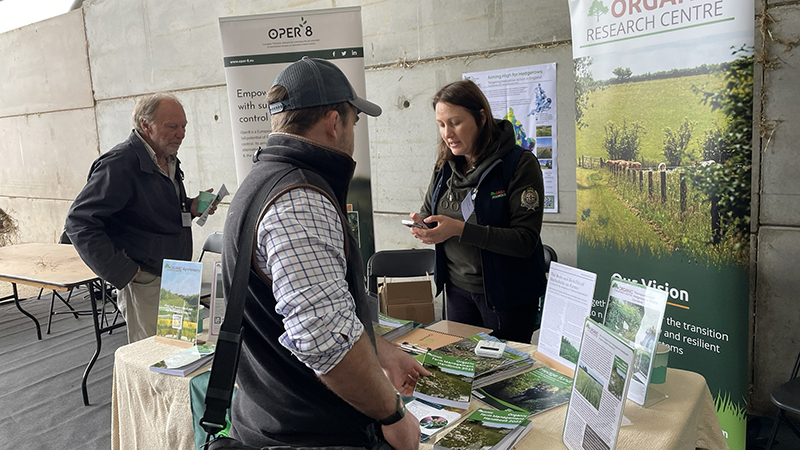
The speaker sessions began with OF&G’s chief executive, Roger Kerr setting out five priorities for the organic movement, stressing the importance of unity.
“There is power in organic as a system to drive real change – that’s what we need to promote. To deliver the critical mass that underwrites the sector’s position and supports the environment and rural economies, we must galvanise our efforts,” said Mr Kerr.
Guests also heard from independent farming advisor, Niels Corfield who introduced some of the soil maintenance practices employed in the agroecological systems at Kingsclere.
Oliver Rubinstein (ex of this parish) from Trinity AgTech provided insight into environmental benchmarking and suggested that certified organic farmers hold a strong position when it comes to accounting for their natural capital gains.
Kingsclere Estates has recently become the first organic farm in AHDB’s Monitor Farm Programme. The levy board’s knowledge transfer manager, former ORC researcher Henny Lowth, spoke about the role of the programme as an exchange hub, sharing performance information and best practice. “It is so important for knowledge exchange between different farmers to learn from organic and from each other.”
The Organic Research Centre (ORC) presented this year’s Young Organic Farmer and Grower of the Year awards. The award was jointly given to Adam Beer and Rita Oldenbourg, head growers at Pitney Farm Market Garden in Somerset and Chris Gospel from Auchmacleddie, a mixed farm in Aberdeenshire, the winners each receiving a prize of £1,500.
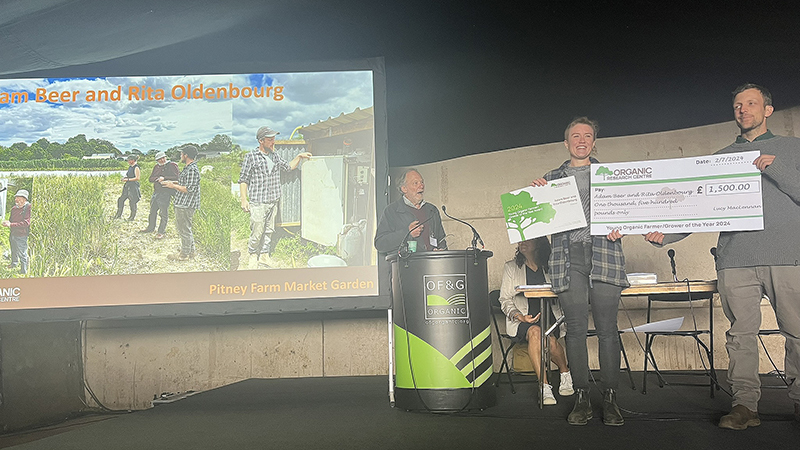
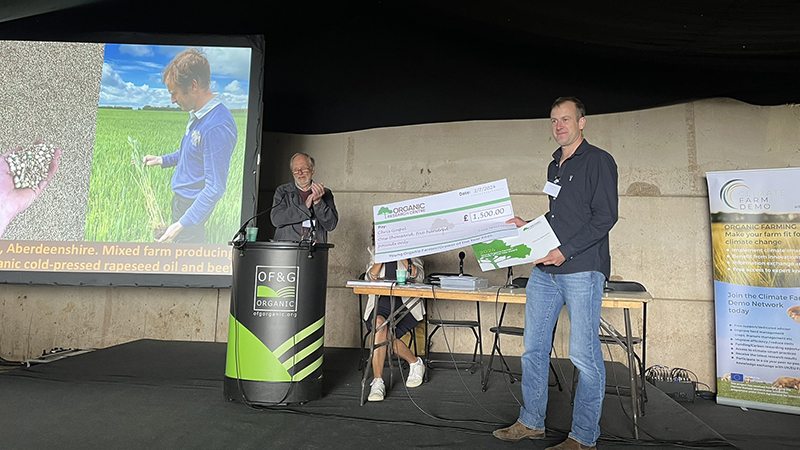
Chair of UK Organic (previously known as the Organic Trade Board), Adrian Carne talked about the need for better differentiation of organic.
“Sustainable farming has become a congested and crowded marketplace. This complexity and confusion has contributed to a lack of growth in the sector. Our job is to create demand, to instil growth and ultimately to become more profitable,” he said.
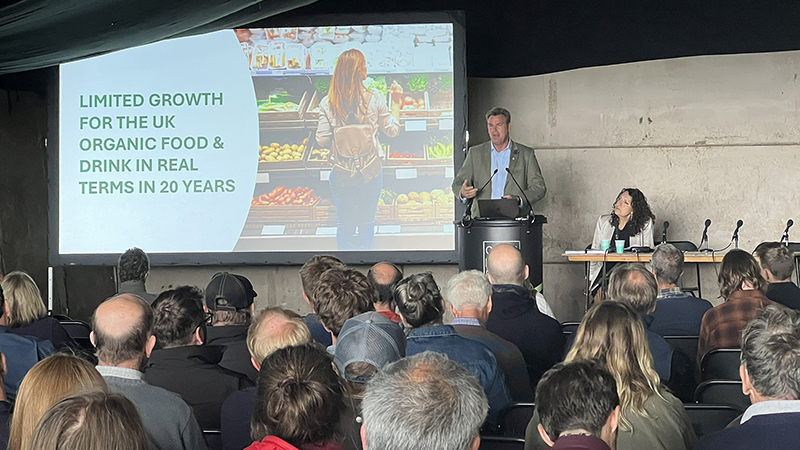
In presenting findings from the organic stakeholder workshop held at Kingsclere Estates the previous day, Christopher Stopes, policy advisor for OF&G and co-chair of the English Organic forum with Adrian Steele from the Soil Association, described some of the constructive policy discussions they have had with Defra this year, they are confident that with the new UK government those discussions will continue to make progress.
Introducing the farm walk Tim May provided an overview of the farm’s organic journey and his vision to grow differently and to grow potential.
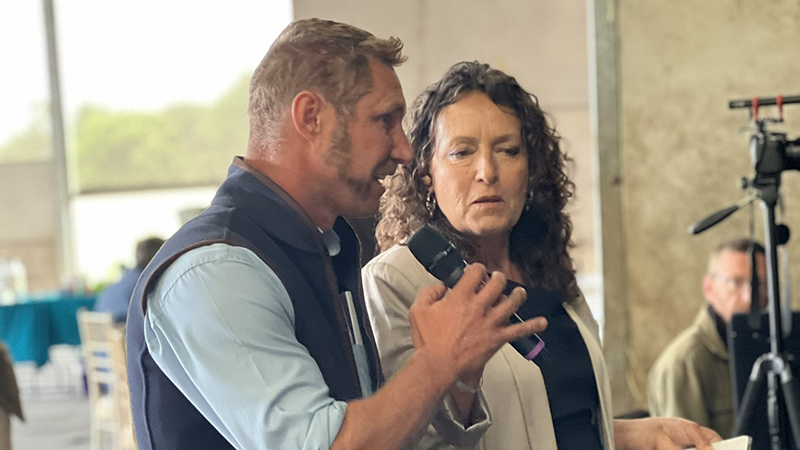
Conference delegates were then guided round five stations located on the farm to hear about and to see the innovative developments in practice at Kingsclere Estates.
“There was a real desire to get off the commodity merry-go-round. We’ve learnt that the more we do, the more we get by holistically managing the land,” explained Mr May.
On the farm walk ORC’s Lindsay Whistance, Charlotte Bickler, and Isi Mackintosh presented the latest developments in organic crop variety testing and resilient livestock. Charlotte Bickler introduced the EU Liveseeding project, which is dedicated to scaling up organic production across Europe by testing diverse cultivars specifically suited to organic systems. In the UK, the project is focused on winter wheat and spring bean production, the winter wheat trials have adopted a living lab approach that involves nine farms testing a total of 13 varieties. This collaborative, networked living lab approach builds on previous work done at ORC as part of the Livewheat project.
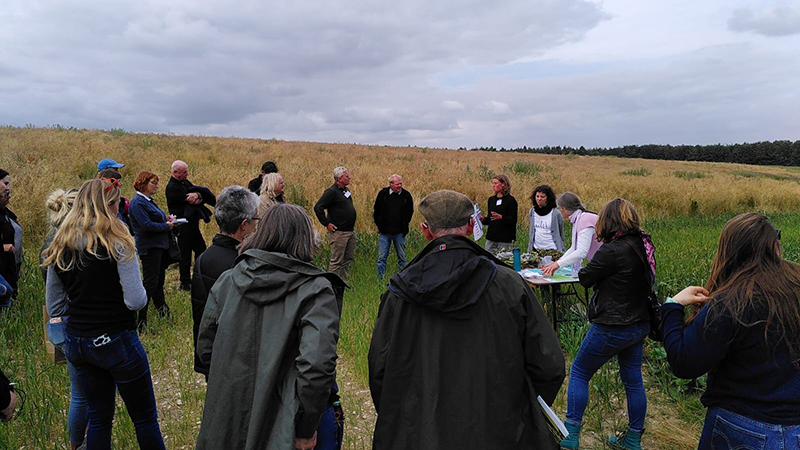
During the farm walk, Charlotte elaborated on the benefits of this approach while guiding participants through the spring bean variety plots, some of which are being tested in the spring bean plot trial in Herefordshire. Further along, the group looked at plots of spring wheat, including Mariagertoba and YQ (ORC Wakelyns Population) plant populations being grown at the Kingsclere estate. These trials are part of a broader effort to utilise genetically diverse wheat populations, which aim to increase crop species diversity, reduce dependency on artificial inputs, and develop more resilient crops in the face of climate change. This approach is integral to the Liveseeding wheat trials, emphasising the creation of robust agricultural systems through genetic diversity.
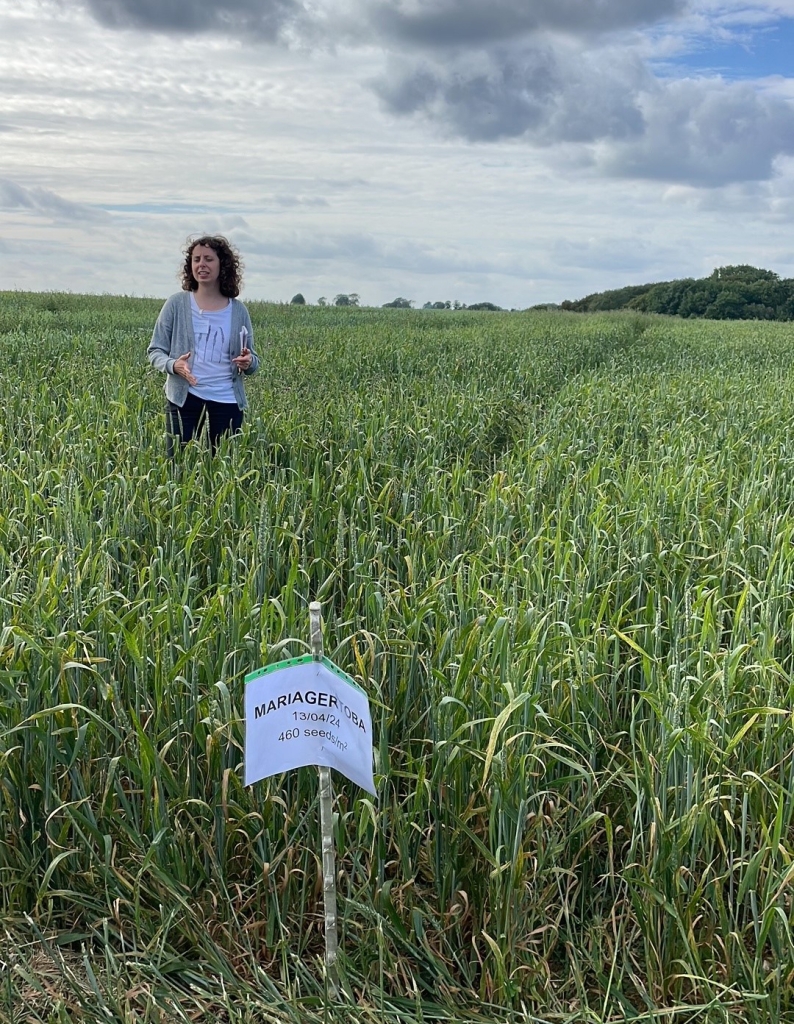
Isi Mackintosh provided additional insights into the spring bean plot trial, which includes seven single varieties and three blends to determine the varietal performance under organic conditions. A key focus of this research is developing a vigour score throughout the bean growth stages, as early vigour is a critical trait for outcompeting weeds. Preliminary results shared at the station highlighted the significance of this trait and its potential impact on organic bean production. As with winter wheat, most of the resources and material for bean production is currently based on high-input production systems. We hope that the plot trial as well as further research on the winter wheat varieties allows us to unpick the agronomic challenges of growing both crops and determine the variety and agronomic factors to improve production in organic systems.
As part of Kingsclere’s enterprise stacking, delegates heard from Oliver Chedgey, business co-founder of The Roaming Dairy Limited which operates as a shared farming agreement.
Milking 480 New Zealand Friesian Jersey crossbreed cows are milked once a day, this innovative mobile approach offers flexibility as well as improving both soil fertility, in keeping with the wider regenerative farming activities.
Sam Lane from Cotswold Seeds described the diverse seed mixture in the herbal leys he has helped Tim and Oliver establish on the farm, and talked about the benefit of getting a seed mix right for each soil type and set of management practices.
Looking back on the day, Steven Jacobs, OF&G business development manager and NOC coordinator, thanked Mr May for showcasing his farm and demonstrating organic in action.
“We hope our guests have come away from NOC feeling inspired by everything they’ve seen at Kingsclere. Tim is clear and strategic in how he manages the different enterprises on the farm and his passion and dedication shines through. We saw brilliant examples of organic management in practice on the farm walk and we heard some robust opinions during the morning debate, all of which make an invaluable contribution in guiding the sector at this pivotal time. As Tim so succinctly put it, “now the organic sector must ‘act with purpose.’” said Mr Jacobs.
